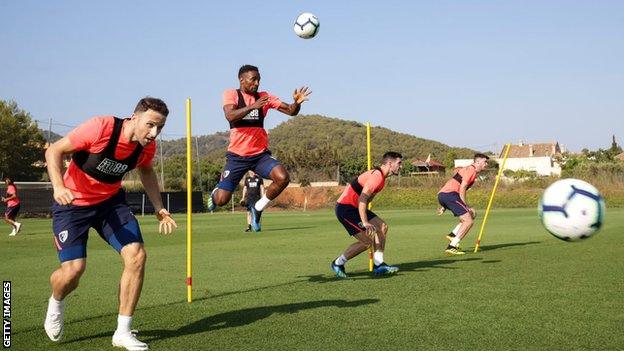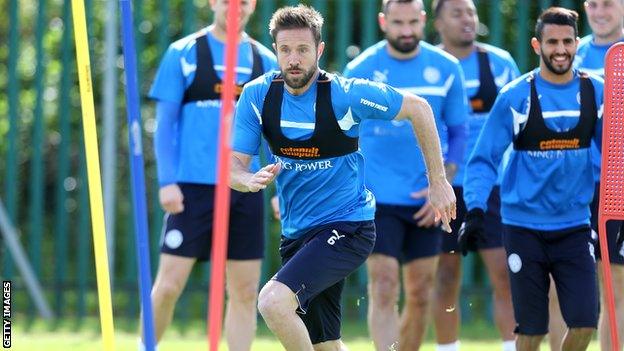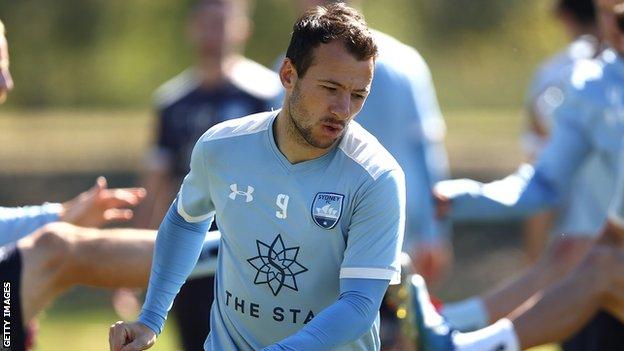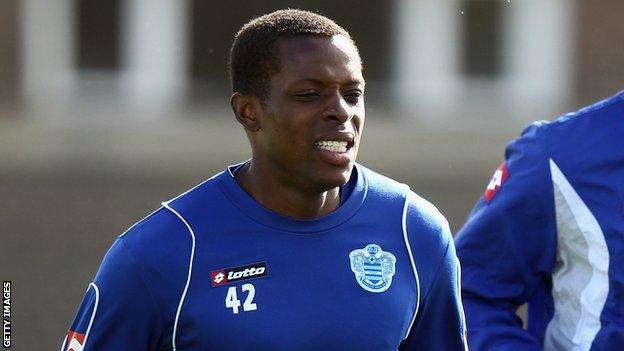‘A physical and psychological nightmare’ - the horrors of pre-season
- Published

In years gone by players would not see a football during the first weeks of pre-season training
Pre-season training used to be brutal. It was often designed to be as unpleasant as possible. Players were pushed to their limits and beyond, both mentally and physically.
That approach is now considered outdated and counter-productive. Where once pre-season was a means to impose discipline and work off summer excesses, players are now expected to return in good condition, ready to pick up where they left off. That was not always the case.
"A dramatic change came around with sports science people getting involved," says former Aston Villa and Birmingham City defender Liam Ridgewell. "The first week nowadays is very light. They don't want too many injuries.
"You're eased back in, so you haven't got the lung-busting runs we used to have. It's normally single sessions in the morning. Back in the day, you were doing doubles for the first month."
Twenty years ago, when Ridgewell was part of the highly regarded Villa youth set-up, an old-fashioned attitude prevailed. Endless running was the order of the day, even if some players were not prepared to take it seriously.
"You'd leave the training ground at Bodymoor Heath and run to Drayton Manor, round and then back," he recalls. "You had some of the boys hiding in bushes and jumping out at you on the second lap because they didn't really want to do it."
Lots of managers set out to make their players suffer in pre-season, believing they would be stronger for it. Starting his career with Luton Town as a teenager, future England international Matt Upson was daunted by the prospect.
"Sometimes we'd go to places to run and train until you were looking at your breakfast on the floor," he says.
"That was the mentality of a pre-season. That used to be met with a bit of nervous tension, especially when you'd go somewhere obscure - a ridiculous set of hills - and you'd get out of the minibus. You'd have those butterflies in the stomach, knowing what was to come."
Although pre-season has changed a lot over recent years, incorporating sleep monitoring, GPS trackers and individualised training plans, that edge has not entirely disappeared. Mental strength and endurance are still required to make it through.
Towards the end of his career, as the Stoke City squad flew out to Austria, Upson did not know quite what to expect. It was his first and only pre-season under notorious taskmaster Tony Pulis, who gladly lived up to his reputation.

Matt Upson admitted to a feeling of nerves around pre-season training
"A lot of the players had worked with him before," says Upson. "They were like: 'Just wait and see where we're going.'
"We went to this mountain and rode bikes up it one morning, at 6am. Then we trained in the gym in the middle of the day and did a football session late afternoon. The next day we cycled there and ran up and down the mountain. It wasn't a gradual gradient. He'd be there with the staff, timing everyone in groups.
"You'd get back to the hotel and there was a real level of satisfaction and achievement, having finished it. It builds your mentality and belief in your ability to push beyond what you thought the boundaries were."
Marc Pugh encountered something similarly taxing, albeit rather closer to home, when he was coming through the ranks at Burnley. Terry Pashley, the club's youth team manager, enjoyed testing his players on difficult terrain.
"First day, we'd run through a forest as fast as we could, and it was so uneven. It was just ridiculous. We'd meet the manager at the bottom of the hill. I sometimes like a bit of old-school, but this was on another level," says Pugh.
"When everyone had got there, we'd do interval sprints up the hill. The quicker you got to the manager, the more rest you got before you did the hill, so you had that incentive. That was before the actual session started.
"You got absolutely slogged back in the day. You used to run until you dropped."
The winger discovered a more sophisticated approach at Bournemouth, where he spent eight years working with Eddie Howe as they climbed the divisions. Fitness work was often disguised within complex, technical drills.
"We got brought into a presentation room and the gaffer tried explaining this drill. There were arrows everywhere. We were looking at it, thinking 'oh my gosh'. It was full pitch. There was passing, crossing, finishing, tackling - everything involved.
"We went out on the training ground and it was absolutely incredible how he'd come up with it. You were in groups. You'd have a one-v-one attacking drill. You'd take your shot and run round to the next station. You'd do some fast feet. Then you'd attack a defender and get another shot off. You'd run to the next stage and attack a cross," he explains.
"Pre-season at Bournemouth was always really tough, but in a fun, enjoyable way."

Adam Le Fondre has experienced a lot of change in pre-season training over his 17-year career
Pre-season can be a great time for players to bond, particularly if new signings have joined the squad. Adam Le Fondre has seen groups brought together through fun activities and shared sacrifice on the training pitch.
"I've been to places where they let you play golf or have a night out," he says. "Sometimes they run you into the ground. After you've been down to the bottom, you seem to have a much better bond when you come back up."
In his 17 years as a professional, encompassing England's top four divisions, a couple of pre-seasons stand out. His first, under Chris Turner at Stockport County, was a shock to the system.
"I didn't know how to prepare myself for it. I remember coming in and I was miles off it. There was lots of high-intensity running, and high-volume running as well. That was very hard for me to cope with as an 18-year-old," says the striker.
"I did one pre-season at Rotherham where we'd do swimming for an hour before training. We'd do running in the morning, and then small-sided games in the afternoon. That was pretty much a 7am-4pm day, which was incredibly tough."
In Le Fondre's experience, there has been a clear shift in emphasis over the past decade. Players, coaches and clubs have a much better understanding of fitness and injury prevention. Pre-season has become more targeted - and less strenuous - as a result.
"Managers don't really take pre-season; they trust their sports scientists and fitness coaches, who do all the research on how to get the best out of the players," he says.
"It's catered to you as a player. Players are turning up fitter for pre-season. They're understanding the strains they're going to put on their body and they're getting themselves ready for that."

Nedum Onuoha moved to Real Salt Lake in the United States after leaving Queens Park Rangers
Pre-season does nott always go to plan though, as Nedum Onuoha knows only too well. In 2011, an uncompromising Roberto Mancini made it clear the Manchester City academy graduate's time at the club was coming to an end.
"It was the Saturday before pre-season was supposed to start," says Onuoha. "I was at Centre Parcs and I got a text from the club saying 'don't come in on Monday, come in on Saturday'. I was like 'oh, that's cool, I've got extra time off. They've put pre-season back.'
"I sent a few messages around and saw that it was just myself, Wayne Bridge, Emmanuel Adebayor, Craig Bellamy and Roque Santa Cruz. We basically got taken off the pre-season.
"You couldn't fight it because you weren't there. I didn't even realise that, by the time we came in, the rest of the squad weren't going to be there. They were travelling to America on that Friday. We were training with the Under-16s."
After being sidelined by Mancini, the defender joined Queens Park Rangers. During a turbulent period for the club, he experienced pre-season training under several different managers. Two in particular left an impression.
"We had Harry Redknapp in 2013," he remembers. "Because we'd just been relegated, he wanted a certain type of personality at the club, so he made pre-season as hard as possible. That first week or 10 days was really horrible. He was trying to test people.
"We used to do one-v-ones. You're supposed to do it for a minute, but for some people he'd go and take the stopwatch himself. It wouldn't stop until he decided one person had been 'killed' enough. I remember one guy was literally on the floor and he was saying 'get up, get up, you have to do this'."
Ian Holloway could be demanding too. One routine is infamous among his former players. He likes staying at a specific hotel in Portugal during pre-season - partly for the facilities and partly for the imposingly steep hill nearby.
"Anyone who's ever played for him will remember this hill," adds Onuoha. "When we were at QPR, he made it the hardest he's ever made it. You're supposed to do it in three sections, but he made us do the whole thing. It's a three-minute run up this road and it's disgusting. We did it for three or four days in a row.
"He got really angry one day because he said we weren't racing each other. There were two people who were laughing and joking as they crossed the line. He was going to punish us unless we did the run again and went all-out.
"It was a physical and psychological nightmare. That's like a rite of passage for him to go into a season. He must have had success there in the past, which is why he keeps going back, but it still gives me chills now. This is why I'm happy I'm retired."